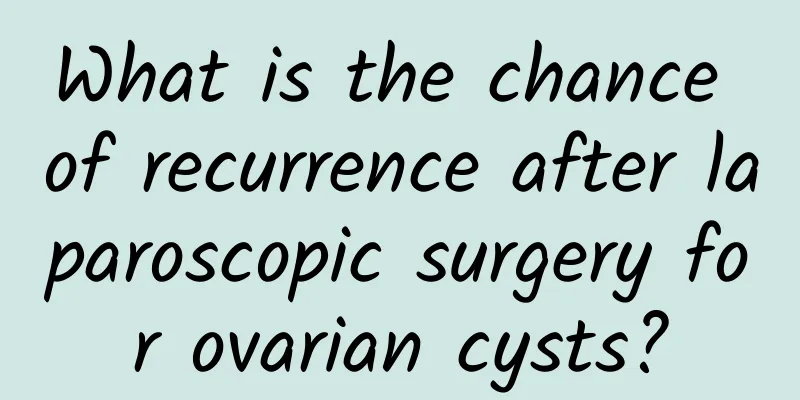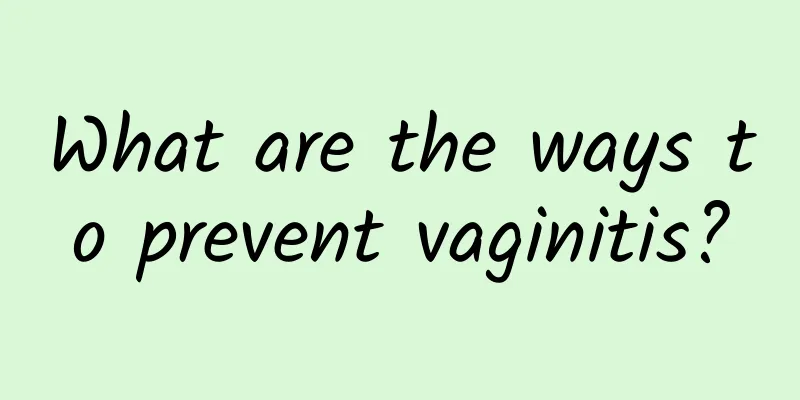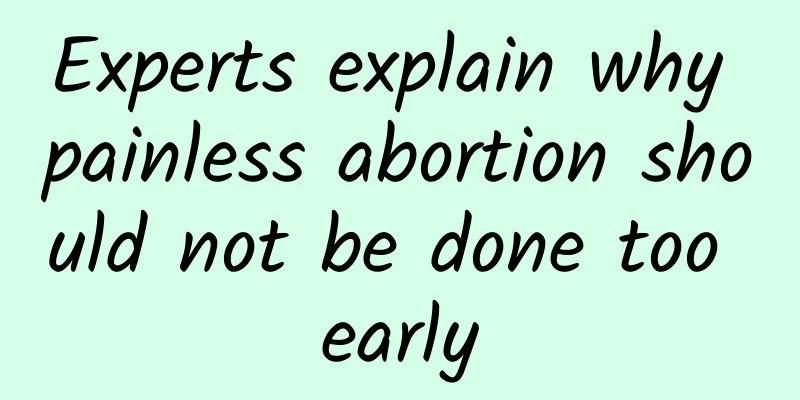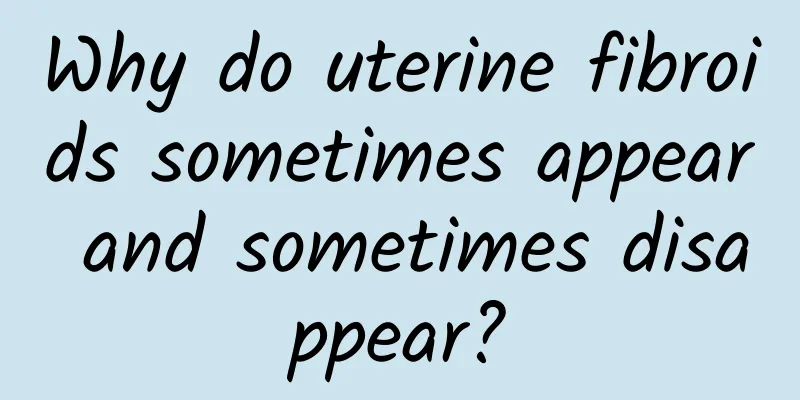What is the chance of recurrence after laparoscopic surgery for ovarian cysts?

|
The treatment of ovarian cysts requires finding corresponding treatment methods, but many people worry about whether they will recur after the treatment. So, will ovarian cysts really recur? As far as we know, ovarian cysts can occur at all ages, and the incidence rate is mainly in women aged 20-50. Ovarian tumors are common tumors of the female reproductive system. Regarding whether ovarian cysts will recur, experts say that ovarian cysts are clinically manifested by lower abdominal pain, lower abdominal discomfort, increased leucorrhea, yellow leucorrhea, leucorrhea odor, and irregular menstruation. There is usually a solid and painless mass in the lower abdomen, and sometimes pain during sexual intercourse. When the cyst affects hormone production, symptoms such as irregular vaginal bleeding or increased hair growth may occur. If the cyst is twisted, there will be severe abdominal pain, dyspnea, decreased appetite, nausea and fever. Larger cysts will cause pressure near the bladder, causing frequent urination and difficulty urinating. Especially when these symptoms are more severe, bleeding is frequent, and chocolate cysts (left) appear at the same time, women are more likely to suffer from ovarian cysts, and the harm of malignant ovarian cancer is greater. The appearance of ovarian cysts is a very common phenomenon. Most cysts are caused by changes in the normal function of the ovaries, so the vast majority of ovarian cysts are benign. But if the nature of the cyst changes to malignant, it becomes ovarian cancer. Will ovarian cysts recur? Ovarian cysts are caused by ovarian diseases and endocrine disorders, which lead to decreased immune function and develop into abnormal proliferation of ovarian tissue, turning into ovarian cysts. Therefore, ovarian cysts should be treated in time. However, some patients have heard that ovarian cysts are easy to recur even after treatment. Will ovarian cysts recur? Ovarian cyst recurrence is not uncommon in clinical practice. Due to the existence of an environment in the body that forms ovarian cysts, the probability of disease recurrence is very high. To prevent the recurrence of ovarian cysts, it is necessary to enhance the body's resistance while actively treating ovarian cysts. Therefore, ovarian cysts will still recur, so women must strengthen nutrition, actively exercise, and improve their immunity. The above is an introduction to the recurrence of ovarian cysts. Many women are worried about the recurrence of ovarian cysts after they are cured. In today's society where medical technology is constantly developing, there is no need to worry about the recurrence of ovarian cysts. How long do I need to rest after minimally invasive surgery for ovarian cysts? There is now a minimally invasive surgical treatment for ovarian cysts. Today is the second day, and I feel better than before, and I don't feel any severe discomfort. We asked ourselves if we could rest for three days, but the doctor said we could rest for a few days. We don't know how long it usually takes to rest after an ovarian cyst undergoing a minimally invasive surgery. Ovarian cysts usually take a week to rest and minimally invasive surgery can work two weeks later. At the beginning, you should stay in bed for three to five days, which will be beneficial to the patient's recovery. If conditions permit, you can wait until you have worked for half a month, or even can't leave for a lot. You still want to rest for a week. At least not too much fatigue and work, especially heavy work, and no strenuous exercise and activities. Just try to avoid stairs to avoid adverse effects on postoperative recovery. You also need to go to the hospital for regular check-ups to let the doctor see how you are recovering after surgery so that you can feel more at ease. As long as you pay more attention to taking care of your body, you will soon return to a healthy state. You cannot have sexual intercourse within one month after the operation. You must take contraceptive measures after this period. For example, patients who undergo minimally invasive surgery cannot get pregnant within 6 months after the operation. If you get pregnant, it will have some adverse effects on the recovery of the female body and the health of the fetus. So try to use contraception, but you must pay attention to contraception and avoid long-term use of contraceptives. Try to choose contraceptives worn on condoms and rings, which are more reliable. Also, don't eat foods containing hormones after the operation, otherwise there will be some side effects. Don't eat spicy things. Finally, patients should drink as much water as possible within a short period of time after surgery, which can effectively relieve postoperative weak sweating. Appropriate activities after meals will help improve indigestion. Avoid always eating junk food, especially salty and fried food, and avoid eating seafood. |
<<: Ovarian cyst pedicle torsion care ovarian cyst precautions
>>: Will ovarian cysts cause pain?
Recommend
The symptoms of vulvar leukoplakia include the following:
Many people must know or understand the disease o...
Patients need to understand the diagnosis of irregular menstruation
At present, irregular menstruation is a very seri...
What are the symptoms of bacterial vaginosis?
Bacterial vaginosis is more common in elderly wom...
Regular intake of hawthorn can effectively relieve menstrual irregularities
The occurrence of irregular menstruation is relat...
Hyperprolactinemia postoperative diet
The first thing to do in treating hyperprolactine...
Is it better for your health to have an abortion or a medical abortion?
When facing an unexpected pregnancy, choosing bet...
Does endometrial tuberculosis have symptoms of excessive leucorrhea?
Endometrial tuberculosis is a disease with a wide...
Mushroom pot is low in calories and delicious? Shiitake mushrooms, enoki mushrooms, and king oyster mushrooms have the highest calories...
When eating hot pot in winter, people are afraid ...
Which hospital is good at diagnosing pelvic peritonitis?
Acute inflammation of the female internal reprodu...
First case! New Taipei City found ractopamine in hamburger meat
The New Taipei City Health Bureau conducted a ran...
How to choose soy milk steamed buns that can be easily eaten out for weight loss?
In Taiwan, in addition to the most common soy mil...
Choose the right food! You can lose weight even if you eat three meals a day
Many people must have had the idea that "you...
What are the main points to pay attention to after painless abortion?
Generally speaking, painless abortion does not ca...
Eight of the top ten causes of death are related to obesity! Losing more than 5% of your weight can have unexpected health benefits
According to the "National Nutritional and H...
To burn fat and lose weight, aerobic + anaerobic are not enough? 5 high-intensity training methods to burn calories quickly
It is generally believed that aerobic exercise is...









